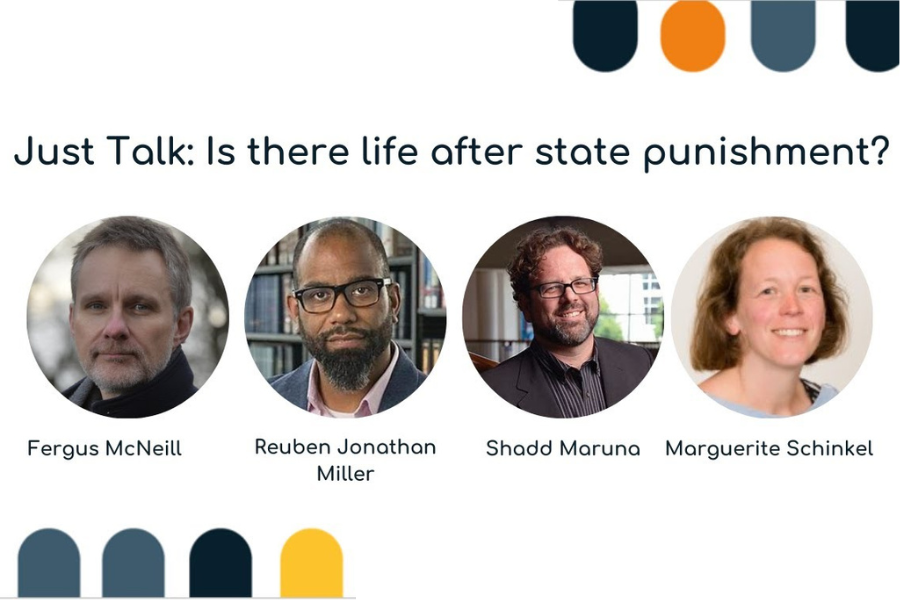
During the most recent IACFP board meeting, there was discussion on how exciting it would be to bring together past IACFP Distinguished Scholars to discuss criminal justice reform on a video platform. The opportunity was not possible due to scheduling challenges; however, Fergus McNeill shared a video with us that discussed the issues of community integration for individuals who have experienced the criminal justice system. This discussion involved three IACFP Distinguished Scholars: Reuben Miller, Shadd Maruna, and Fergus McNeill, as well as Marguerite Schinkel, Senior Lecturer, University of Glasgow. This article summarizes the video.
Punishment and Reintegration
The panel first discussed definitions of punishment and reintegration. They focused initially on state punishment imposed by the courts and incarceration, and then added community sanctions to the discussion. One of the reasons for doing this is that when considering life after punishment, it’s necessary to consider the legal constraints that may continue to be imposed upon individuals (e.g., laws limiting civic participation, labor market restrictions, and other laws requiring registration, housing restrictions, etc.). Life after punishment is more than just staying alive. These scholars pointed out that it is also whether individuals can lead satisfying and fulfilling lives and be integrated in society.
Vulnerabilities
The panel also talked about the vulnerability that is imposed upon not only the individuals who have been involved in the criminal justice system, but upon their loved ones as well. They identified the following impacts that can be felt by the person who has been incarcerated and their family members:
- Stigma;
- Decreased ability to participate in community and culture;
- Fraying of family ties;
- Vulnerability and instability;
- Constant threat of additional harms; and
- Disparate impacts involving foster children and housing.
Sadly, they said that punished people become liabilities for their families, especially through laws and regulations that follow them into the community. Beyond being the collateral consequences of conviction, a family can be punished if they help a returning citizen. While the panel was discussing all individuals returning to the community, I could not help but think about the additional stigma, sanctions for failure to follow mental health treatment plans, and vulnerability of support systems for individuals who experience serious mental illness and mental health challenges.
Importance of Hope
Marguerite Schinkel’s research has focused on those individuals who are at the end of long sentences and those who are cycling through prison-to-community-to-prison. She shared that those who are at the end of long sentences often experience hopelessness in the community because they are not able to reach their goals and live the kind of full life they had hoped for. They begin to question: What is the point of their hard work in prison? The panel’s discussion evolved into consideration of masculinity and gendered roles, because most of the individuals they’ve included in their research have been male. One of the points made later in their discussion was that our theories of masculinity have never captured views of people from marginalized communities and their experience with care work. They also considered the impact on family life when benefits are reduced but the individual can’t find employment to counterbalance those reductions.
The discussion the scholars had regarding hope was thought provoking. They first talked about hope and the correlation with desistance. This correlation is based on individuals having the will and ways to change; the wherewithal to realize their vision for returning to community and friends. They point out that so much of what criminal justice systems do undermines hope. It is worth considering how this might impact an individual with serious mental illness. Shadd Maruna said, “Hope is often profoundly relational.” For an individual with serious mental illness, this becomes even more significant and rare.
All the scholars reported seeing stories of hope. They described it as people being able to see themselves in a different way; both materially and socially (what they do with other people). Those most successful in reintegrating into society have often been individuals who are responding to conditions they live in and projecting new social situations, as well as those who become activists. For the latter, one of the challenges is that doing time is not the end of it. As Reuben Miller described it, “People find lives but it’s never the end of it.”
Generativity
Many IACFP Bulletin readers may be especially interested in the discussion the scholars had on generativity. They discussed how the justice system thwarts generativity and the impact this has on young offenders. I considered how this might be further expanded to consider the impact on those individuals, especially from youth to young adulthood, who experience both the justice and mental health treatment systems or failures to receive treatment.
- How much of the damage that may be done by a justice system component is greater due to mental illness?
- How might we mitigate these impacts, beyond prevention and diversion from the justice system?
- Do mental health treatment practitioners need to include a focus on generativity in their treatment plans so that individuals are better able to not get stuck in a developmental stage that is much earlier than their age?
The scholars identified the following ways to find generativity:
- Within the family
- Within their work
- Craft
- Fundamentally making things; creativity
- To be a maker of things
- Making a difference/Giving Back/Paying it Forward
Pathways to Hospitality
The final segment of this discussion focused on hospitality. They described a commitment to hospitality as ensuring that individuals have a place in the world. When we label individuals as “criminals” or by their offense (e.g., “murderer”), distance is created and people who have caused us or society harm do not have a place in the world. The panel clearly articulated that we are socialized as a society and invited to feel hostility rather than hospitality toward these individuals. While they acknowledged the need for structures for accountability, they also see the need for pathways to hospitality. This discussion and the brief one on temporalities was thought-provoking for individuals working in corrections and especially for those working with individuals who are seriously mentally ill and experiencing mental health challenges.
To view the entire discussion, go to https://www.sccjr.ac.uk/video/sccjr-just-talk-is-there-life-after-state-punishment/

Cherie Townsend is the IACFP Executive Director. She also works as an executive coach and consultant. Ms. Townsend previously worked as a leader and practitioner in juvenile justice systems for nearly 40 years.

